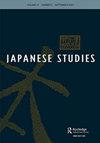‘Ojisan gokko shiyo! [Let’s pretend to be old men!]’: Contested Graphic Ideologies in Japanese Online Language Play
IF 0.4
Q3 AREA STUDIES
引用次数: 1
Abstract
ABSTRACT This article examines how social beliefs about language use and users influence writing-restricted variation in contemporary Japan by analyzing ojisan gokko (‘impersonating middle-aged men’), a practice where young Japanese women playfully message each other as though they were lecherous men. While the production of a stylized ojisan voice during ojisan gokko involves many traditional Japanese indexes (markers) of ‘male’ language, it also relies prominently on particular uses of script, emoji, kaomoji, and punctuation, ultimately creating a form of mocking which is bound to the written mode. Using indexicality as a framework, the article analyses 195 screenshots of ojisan gokko acts shared on Twitter to establish which writing-restrict forms are key to the practice, and examines the multiple social motives and origins behind these forms. Ultimately, ojisan gokko is noted to involve a complex interplay of variants traditionally linked to distinct social groups, with this combined use traced to a series of Japanese social actors observing, imitating, discussing, or parodying how others write. Consequently, ojisan gokko shows that writing-restricted variation can be highly motivated by social concerns, ideologies, and conflicts, including the desire to establish, contest, and modify which identities and forms of language use are appropriate or ‘cool’.Ojisan gokko shiyo!让我们假扮成老人吧!日本网络语言游戏中存在争议的图像意识形态
本文通过分析“假扮中年男子”(ojisan gokko)——一种年轻日本女性互相开玩笑地发信息的做法,就好像她们是好色的男人一样——来研究关于语言使用和使用者的社会观念如何影响当代日本写作限制的变化。虽然在“男声”过程中,一种程式化的“男声”声音的产生涉及到许多日本传统的“男性”语言指标(标记),但它也明显依赖于脚本、表情符号、kaomoji和标点符号的特殊使用,最终创造出一种与书面模式相结合的嘲弄形式。本文以索引性为框架,分析了195张在Twitter上分享的ojisan gokko行为截图,以确定哪些写作限制形式是这种实践的关键,并考察了这些形式背后的多重社会动机和起源。最后,ojisan gokko被注意到涉及到传统上与不同社会群体相关的变体的复杂相互作用,这种综合使用可以追溯到一系列日本社会行动者观察、模仿、讨论或模仿他人的写作方式。因此,ojisan gokko表明,受写作限制的变异可能受到社会关注、意识形态和冲突的高度激励,包括建立、竞争和修改哪些身份和语言使用形式是合适的或“酷”的愿望。
本文章由计算机程序翻译,如有差异,请以英文原文为准。
求助全文
约1分钟内获得全文
求助全文

 求助内容:
求助内容: 应助结果提醒方式:
应助结果提醒方式:


